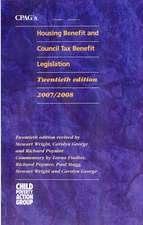Agency Under Stress: The Social Security Administration in American Government
Autor Martha Derthicken Limba Engleză Paperback – iun 1990
Prize-winning author Martha Derthick draws on the recent experience of the Social Security Administration to examine the quality of policymaker's guidance and the feasibility of their policies.
Derthick concludes that many structural features of American government hinder good administration, that policymakers lack concern for administration, and that they often miscalculate the administrative consequences of their policy choices.
To illustrate this argument, Agency Under Stress analyzes two much-publicized cases of poor performance by one of the biggest and best established of U.S. government agencies, the Social Security Administration. The first case is that of the supplemental security income program to support needy blind, aged and disabled persons. Given responsibility of administering the program in 1974, the Social Security Administration was unequal to the task: many payments were made in error; many eligible persons were not paid; computer systems were not ready; field employees worked millions of hours of overtime; and other agency programs suffered.
The second case is that of an eligibility review that Congress ordered the Social Security Administration to conduct for disability insurance recipients in the 1980s. The results were similarly traumatic: of over 1.2 million cases examined, 495,000 had benefits terminated, and, flooded with appeals, the courts ruled overwhelmingly against the agency.
Derthick's analysis and conclusions have far-reaching implications for how the government can effectively serve its clients.
Derthick concludes that many structural features of American government hinder good administration, that policymakers lack concern for administration, and that they often miscalculate the administrative consequences of their policy choices.
To illustrate this argument, Agency Under Stress analyzes two much-publicized cases of poor performance by one of the biggest and best established of U.S. government agencies, the Social Security Administration. The first case is that of the supplemental security income program to support needy blind, aged and disabled persons. Given responsibility of administering the program in 1974, the Social Security Administration was unequal to the task: many payments were made in error; many eligible persons were not paid; computer systems were not ready; field employees worked millions of hours of overtime; and other agency programs suffered.
The second case is that of an eligibility review that Congress ordered the Social Security Administration to conduct for disability insurance recipients in the 1980s. The results were similarly traumatic: of over 1.2 million cases examined, 495,000 had benefits terminated, and, flooded with appeals, the courts ruled overwhelmingly against the agency.
Derthick's analysis and conclusions have far-reaching implications for how the government can effectively serve its clients.
Preț: 214.41 lei
Nou
Puncte Express: 322
Preț estimativ în valută:
41.03€ • 42.33$ • 34.24£
41.03€ • 42.33$ • 34.24£
Carte tipărită la comandă
Livrare economică 27 martie-10 aprilie
Preluare comenzi: 021 569.72.76
Specificații
ISBN-13: 9780815718239
ISBN-10: 0815718233
Pagini: 245
Ilustrații: black & white illustrations
Dimensiuni: 152 x 229 x 19 mm
Greutate: 0.36 kg
Ediția:New.
Editura: Brookings Institution Press
Colecția Brookings Institution Press
ISBN-10: 0815718233
Pagini: 245
Ilustrații: black & white illustrations
Dimensiuni: 152 x 229 x 19 mm
Greutate: 0.36 kg
Ediția:New.
Editura: Brookings Institution Press
Colecția Brookings Institution Press
Notă biografică
Descriere
Prize-winning author Martha Derthick draws on the recent experience of the Social Security Administration to examine the quality of policymaker's guidance and the feasibility of their policies.
Derthick concludes that many structural features of American government hinder good administration, that policymakers lack concern for administration, and that they often miscalculate the administrative consequences of their policy choices.
To illustrate this argument, Agency Under Stress analyzes two much-publicized cases of poor performance by one of the biggest and best established of U.S. government agencies, the Social Security Administration. The first case is that of the supplemental security income program to support needy blind, aged and disabled persons. Given responsibility of administering the program in 1974, the Social Security Administration was unequal to the task: many payments were made in error; many eligible persons were not paid; computer systems were not ready; field employees worked millions of hours of overtime; and other agency programs suffered.
The second case is that of an eligibility review that Congress ordered the Social Security Administration to conduct for disability insurance recipients in the 1980s. The results were similarly traumatic: of over 1.2 million cases examined, 495,000 had benefits terminated, and, flooded with appeals, the courts ruled overwhelmingly against the agency.
Derthick's analysis and conclusions have far-reaching implications for how the government can effectively serve its clients.
Derthick concludes that many structural features of American government hinder good administration, that policymakers lack concern for administration, and that they often miscalculate the administrative consequences of their policy choices.
To illustrate this argument, Agency Under Stress analyzes two much-publicized cases of poor performance by one of the biggest and best established of U.S. government agencies, the Social Security Administration. The first case is that of the supplemental security income program to support needy blind, aged and disabled persons. Given responsibility of administering the program in 1974, the Social Security Administration was unequal to the task: many payments were made in error; many eligible persons were not paid; computer systems were not ready; field employees worked millions of hours of overtime; and other agency programs suffered.
The second case is that of an eligibility review that Congress ordered the Social Security Administration to conduct for disability insurance recipients in the 1980s. The results were similarly traumatic: of over 1.2 million cases examined, 495,000 had benefits terminated, and, flooded with appeals, the courts ruled overwhelmingly against the agency.
Derthick's analysis and conclusions have far-reaching implications for how the government can effectively serve its clients.












